Dream Theater bassist tells FBPO the band’s whole story, including influences, equipment and lots more!
Exclusive interview with FBPO’s Jon Liebman
March 31, 2014
John Myung is a founding member of the popular progressive metal band Dream Theater. He is an inductee to the Long Island Music Hall of Fame and was named the Greatest Bassist of All Time in a 2010 Music Radar reader’s poll.
FBPO: Tell me about your musical upbringing. You’re from Chicago, right?
JM: Yes, I was born in Chicago, but I grew up in New York. It started, I guess, with classical lessons. I went to a Catholic school when I was really young for a little while in New York City and I learned Suzuki method for violin at around age 5, so I started kind of early. I stuck with it for ten years. Eventually, I guess my parents had had enough of city life and they wanted to move out to the suburbs. When I was 7, we moved out to the suburbs and I studied music with private teachers in the town where I grew up, Kings Park, Long Island. From there, it was just kind of something that I did.
At around age 15, I lost interest in violin. I was more interested in playing bass. There was a lot of musical activity in my neighborhood. It was really cool. For some reason, all my friends were really, really into music and they started forming bands. John Petrucci formed a band in his neighborhood and I was part of a band in my neighborhood. It was just kind of this neat collection of musicians and we all hung out together and traded off on records. A lot of my friends had older brothers and sisters and, looking back, I realized what a big influence they had on us because it was their record collections that had Jethro Tull, Sabbath, Rush, Yes. As a young kid, I didn’t really know who these bands were. It was my friends and their elder brothers and sisters that really had a big influence on us kids as far as what we thought was cool and what we did with our time.
FBPO: I assume you’re talking about the electric bass, right?
JM: Yes, electric bass.
FBPO: After all those years of playing violin and Suzuki method, did you ever play upright at all?
JM: I think I really wanted to play. I have the equipment. I have a really awesome NS Design upright. I create and tour with the band, so I find it really hard to put it into my musical schedule. When there is time to do something, maybe sonically, as a cool element within a song, I’ll probably find it more useful as a texture or color, but as far as really having the authority to play an instrument like that, you really have to choose your discipline at some point. It’s really hard to spread yourself out over too many different things. I think one of the reasons is probably because I didn’t start off on upright. If I had started out on upright and then gravitated toward electric bass, I think maybe that would have been a better foundation or it would have been easier. But primarily, I’m just an electric player.
FBPO: Who were your influences at that time, as a young, up-and-coming student of bass?
JM: I was really into bands; I wasn’t necessarily focused on the bass players. I think the most important thing that brought me into music was listening to those bands and just kind of identifying with them, with their sounds and stylistically. I just thought it was the coolest thing ever! So it was really just whoever was playing bass in the band that became my focus. I used to love it. I couldn’t wait to come home from school and play along with Black Sabbath records, Who records, Iron Maiden records, Rush records. It just became a thing to do.
I learned a lot just playing along to recordings and I actually think that that’s still a really valuable way to learn and to progress because you’re just working that part of your brain that gets your memory going. Then you start entertaining your own ideas and then you start formulating your own patterns. So I see that as something I would absolutely recommend to anybody that wanted to start playing. I think one of the best things to do is to play along to recordings.
FBPO: You were influenced by those bands, certainly, but from a bass player’s perspective, I guess, without realizing it, you were also influenced by Geezer Butler and John Entwistle and Steve Harris and Geddy Lee and all the bass players in the bands you were listening to.
JM: Yes.
FBPO: What were your musical aspirations at the time? Were you hoping to be a big rock star and tour the world?
JM: You’re always hopeful. You’re always optimistic about what you’re doing and you hope for the best. And things just kept progressing for us. I went to the same high school as John and we actually wound up in the same band. We went to Berklee together and the band formed up at Berklee when we met Mike (Portnoy) and we just practiced six hours a night. It was like a full day of just taking classes and during the evening hours we would jam from like 6:00 p.m. to midnight, Monday through Friday. If you add up the jamming time, it was probably like thirty hours a week. We were just always optimistic and we were always like, “Okay, well let’s see if we can take this a step further. Okay, we got to this point. What’s the next step, okay?”
One thing led to another and we spent the year at Berklee and then decided not to go back and just continue the band efforts. We rented some studio space, which was basically like the basement of a storefront. And there, we just maintained our practice schedule Monday through Friday. Once again, we’d meet up at like 6:00 at night and end at about midnight. It was that. It was the time we put in. That, and a combination of luck, running into really important people that we didn’t know were going to be very important, but very influential.
Our first album came out on an independent label and didn’t really do much. I think the company was called Mechanic Records and they were under the umbrella of MCA. I guess it was word of mouth and us just doing what we were doing. Derek Oliver form Atco Records was sort of looking at us and listening to us and following us and then he took us under his wing and brought us into Atco Records. He put us in the studio with David Prater, who was a really hot producer at the time. He had had some commercial success. It was actually a band called Firehouse that he was producing at the time and he went from them to us. It was just one thing that kept leading on to the next thing. We went to the studio with him, with David Prater, and it was the first time that when I listened back to the recordings, I realized we had a new sound and realized his talent as a producer.
FBPO: I’ve head a lot of adjectives used to describe Dream Theater’s music. What would you call it?
JM: I would call it progressive hard rock. For example, we’ll have a really, really heavy song, like “Pull Me Under,” or even just the Train of Thought album in general is a very, very heavy record. But then we’ll have an album like Otavarium or we’ll have an album like Falling Into Infinity. There’s a lot of diversity within the sound and we’re not limited in that way. Music is music to me. I appreciate really good pop music, I really appreciate great metal music. It’s all sort of what you’re going for at the time. There are songs where we’re trying to capture something really aggressive and heavy and then there are times where we’re playing more of like a ballad or backing away from the real heavy energy and going into something more soothing or more pop or more commercial. There are ways to incorporate all these things and not feel like you’re locked into just one style of music. That’s the really cool thing.
FBPO: That’s a very good point you raised. Dream Theater has always been mindful, it seems to me, of not repeating itself, always coming up with something new and fresh with every release. Tell me about the new record, Dream Theater, and how it fits into that evolution, that progression, that spectrum of the music you’ve been creating for all these years.
JM: There was something about this album that really, really flowed. I remember after we loaded in the gear and set everything up, there was this buzz in the air, a certain electricity and it just drove the whole record. We set up all the gear so that we could record right away, the minute something was written or if there was something we felt had to be captured. “Surrender to Reason” was the first song that was written. I think it was done pretty much within the first ten days of being there. And that set the pace for the whole record.
This record was a lot of fun. We had a lot of moments where we were revisiting older influences, which was really cool. And it was a good balance of sort of concise songwriting and also being able to write outside that framework, like with “Illumination Theory.” It was a lot of fun revisiting older influences. It was a real special record in the fact that it was just this really cool vibe, this real cool energy that was driving the record. I think maybe part of the reason was we started working with Rich Chycki, who’s engineered and worked with Rush a lot. So we brought him in for this record and he was an amazing person to work with. His knowledge of sounds and the things that he did to help improve my bass sound also played into it because a lot of what I played was because of how I was interpreting the sound. The sound has a big influence on how you play, the responsiveness of it and the energy you get from your sound. So it was sort of everything connecting and working out and, for me, it was how to get the sound that I always wanted. I was able to get that with Rich on this record.
FBPO: How does it feel to have been named The Greatest Bassist of All Time?
JM: Well, it’s not really that at all. It’s just according to one website [Laughs]. They did a poll, whatever. I think it’s cool, it’s flattering, it’s an honor, but I don’t take it seriously. I mean I don’t even know if there is such a thing. But it does mean that I’m reaching people, so that’s really cool and I hope that continues.
FBPO: You’re a humble guy!
JM: [Laughs]
FBPO: What kind of equipment are you using, John?
JM: I have a couple of pieces from Demeter amplification. I find that their pre-amp, the HBP-1, is a really neat pre-amp rig. It has three different types of inputs: active and passive and then it has a parametric, as well as your basic treble, bass and mid-range controls. I find it to be really, really clean and transparent and it doesn’t really color the instrument. I use that for a cabinet type of sound. I’ve done some really cool experimental things with it in the studio, where – and this is something that I learned from Rich – where I’m utilizing pedals.
I have an MXR bass compressor and a Mesa Boogie Grid Slammer pedal for that sort of gritty overdrive tone. I actually run my bass straight into the pedals before the pre-amp on the input side, but the key to making that work is to make sure the levels coming out of the pedal are not hotter than the levels going in. You want it line level so you’re not overdriving anything past the pedals. You’re just coloring the sound.
FBPO: Makes sense. What about basses and strings?
JM: I play Ernie Ball Music Man basses. They make me custom 6-strings. The strings that I’ve been using lately are their Cobalt bass strings, which I took to really well. They seem to be a little bit quieter on the fretboard and they tend to just feel better. They just sort of have a softer texture to them. So it’s primarily just Music Man stuff.
FBPO: You’re not really known as a Chapman “stick” player, but I understand you play that too.
JM: I have one. I used it on a song called “New Millennium” on the Falling Into Infinity album a while back. I’ve wanted to use it more, but it’s something that I just haven’t really been able to add, at least to Dream Theater records. I mean, once again, it just falls down to this time factor. I think it’s very important to have something else that takes you away from your primary instrument to give you a different perspective, to change things up and that’s one of those instruments for me. But you’re right, it hasn’t really made its way onto Dream Theater records, apart from one song. It’s just something I do more when I’m at home, but we’ll see.
FBPO: Yeah, it’s a whole different animal.
JM: Yeah, it is, but it’s such a great instrument. There’s nothing that sounds quite like it.
FBPO: How about the future, John? What else would you like to do that you haven’t already accomplished?
JM: One thing that’s clear is I don’t think you’re ever done, as far as what you can learn and things that you want to do musically. I think it’s something that’s constantly evolving. It’s a full-time job. There’s always something to work on, something you can learn, something to listen to. And now, with technology changing, that’s a whole other curve, dealing with new recording technologies, new instrument processing technologies and all the work that goes into staying connected with that world. It’s not as simple as just buying one program. You buy one program and now the operating system needs to be changed. You need to upgrade the software. And then you get a new piece of gear and you have to upgrade the firmware. It’s a whole other discipline. I would just like to continue what I’m doing. I love what I do. I just want to stay healthy and keep playing music.
FBPO: What would you be if you were not a bass player?
JM: That’s a really good question! I don’t know what I would be doing. It would definitely have to be something in the arts. It would have to have that sort of freedom. It’s amazing that I can do what I do now and that we’ve had the success we’ve had. Off the top of my head, I couldn’t picture myself doing anything else.
To purchase DREAM THEATER’s 2013 Grammy-nominated self-titled album, click here.


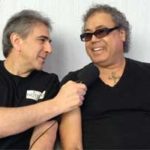
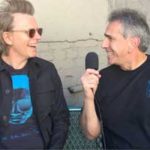
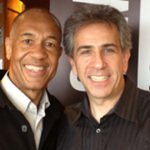
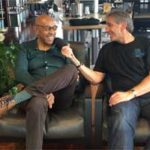
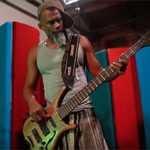
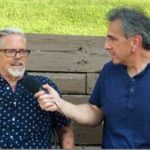

He’s so humble. The self titled is one of their best albums, hands down.
And (to me at least), I attribute much of it to John’s playing. The bass has a phenomenal sound and it doesn’t get lost in the background mix.
He’s the reason I play bass and I love to hear what he liked as a kid and inspires him today.
Great interview!